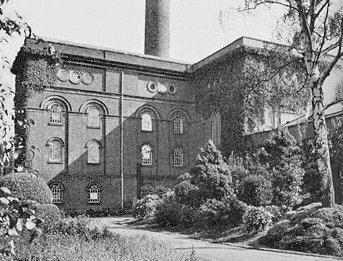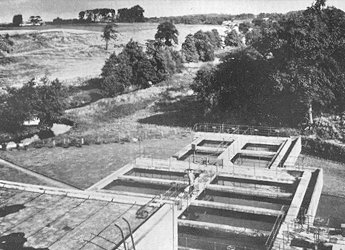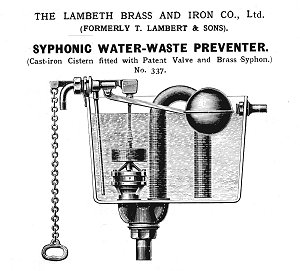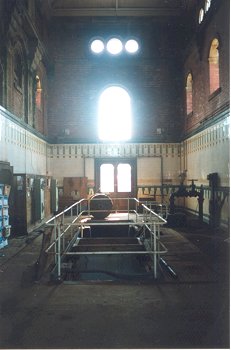|
An Unfortunate Episode
The letter from Dr. Bell startled the members of the Council. They
knew there was some truth in the charge, for the old Waterworks Company
was not able to obtain a sufficient supply for the inhabitants from the
wells at Tettenhall and Goldthorn Hill. The company arranged with Mr.
Dixon to supplement the supply from his old colliery workings on the
Rough Hills. After hearing Dr. Bell's letter, one of the Aldermen rose
and said the water supplied by the company was so bad that, on mixing a
little of it with a glass of brandy a few evenings before, it
immediately turned it as black as ink. The statement was greeted with
laughter.
A few months later the Corporation attempted to take control of the
water company. The Mayor, Mr. Neve ordered the Public Works Committee to
inquire and report on the best way of obtaining a plentiful supply of
pure water.
|
|

Tettenhall Pumping Station.
|
The Committee came to the conclusion that the
most economical method would be for the Corporation to take
control of the water company, and with a moderate outlay new
works could be added to obtain an ample supply. The Committee
opened negotiations with the water company for the purchase of
their undertaking, but after much correspondence and many
interviews with the directors, the negotiations were called off
because the asking price was far too high. |
|
The Council was determined that the matter would not end there and
that a pure water supply would be provided for the town. In May 1854 a
resolution was passed which stated:
"That it was indispensably necessary for the Borough to have the
water supply in its own hands."
|
| The Public Works Committee was ordered to take the
matter up at once, and to employ engineers to locate an
alternative supply. In a short time the location of a suitable
supply was found. It was near the River Worfe at Cosford, where
four streams joined the river. In November 1854 the Public Works
Committee recommended the scheme to the town Council, who
ordered a Bill to be drawn up and a petition to be presented to
Parliament, asking for the power to erect a waterworks at
Cosford. |

Cosford Waterworks in the 1950s.
|
| On hearing this decision the Waterworks Company
prepared to oppose the Corporation’s Water Bill in Parliament.
The Public Works Committee immediately entered into negotiations
with the Waterworks Company and agreed to purchase the concern
for £62,280 on the understanding that the company would withdraw
its opposition to the scheme and that the Corporation’s Water
Bill was passed through Parliament. The town Council was
delighted with the outcome of the negotiations and readily
agreed to them in a meeting on 21st April, 1855. |
|

An advert from 1901.
|
Three months prior to this meeting another
contender appeared in the form of The Water Supply Company,
which also intended to erect a waterworks at Cosford. The
company had a start-up capital of £100,000 and intended to draw
water from near to the Council’s chosen location. The new
company also applied to Parliament for a Bill to allow their
works to be built and so everything now depended upon what
happened in London.
The Council decided to do all that it could to oppose the new
Water Supply Company Bill and a committee was appointed and
instructed to engage expert witnesses to support the
Corporation’s Bill. |
| This all came to nothing however, as the
Corporation’s Bill was rejected and the new Water Supply
Company’s Bill was passed. In giving Judgment the Chairman of
the Parliamentary Committee said that the Corporation had no
power to levy a rate on the inhabitants for the repayment of the
money they proposed to raise for the purchase of the old
waterworks, and they had no right to promote a Bill in
Parliament for establishing a waterworks at the cost of the
ratepayers, without first obtaining their consent. He also said
that the Committee approved of the town’s water supply being in
the hands of the Corporation and gave the Corporation power to
acquire the works of both the new company and the old company at
some future date, at a price to be settled by a system of
arbitration, or on any plan mutually agreed upon.
Almost immediately the jubilant new Water Supply Company
joined forces with the old Waterworks Company, the two
amalgamating after a peaceful settlement. |
| The defeat of the Council’s Bill came like a
thunderbolt out of the blue, it was totally unexpected. The
Council found itself in a terrible position and appointed a
committee to find the total costs and who was liable to pay. The
Council found that it was faced with a bill for £6,500 which it
was unable to pay. A ratepayers meeting was called in the
Exchange, and the Town Clerk, Councillor Shoolbred moved that
the agreement to buy the old waterworks be cancelled. The
actions of the Corporation were denounced in strong terms. Mr.
T. Bolton, a solicitor, said that the two water companies and
the Corporation had been engaged in a "Comedy of Errors", and
now that the Corporation’s Bill had been rejected, the
Corporation was appealing to the ratepayers for help in paying
the Parliamentary costs and counsel’s fees. Mr. H. Underhill
spoke, and urged the ratepayers to have nothing to do with it.
The Corporation sent the Town Clerk to London to consult some of
the leading solicitors on the question of liability. He was also
instructed to draw up a case to be submitted to Sir F. Thesiger,
one of the leading counsels of the day. |

Inside Tettenhall Pumping Station.
|
| Sir Thesiger said that the Corporation had no right to
promote a Bill in Parliament at the cost of the ratepayers for
establishing waterworks. In second place he considered the contract with
the old Waterworks Company was void, for the reason that the sanction of
the Board of Health had not been obtained previously. Consequently the
Corporation was liable for all legal expenses, and these could be
recovered by process of law and the property of the Corporation was
liable to be taken by the creditors in satisfaction of their debts,
which could not be taken from the rates of the Borough. |
|

An advert from 1901.
|
The corporation was in a unique and awful position. It
had to sit back and watch as bailiffs descended on the town hall to
recover property to the value owed. The mayor’s robes, mace and chair
were removed along with furniture from the Town Hall. Uniforms, helmets
and handcuffs were taken from the police barracks, and it was said that
the police were unable to get up for lack of uniforms or stay in bed for
lack of beds. Even the municipal fire engine was taken. The mayor and
the rate collector had to go around the town cap-in-hand to ask for
contributions to pay-off the debt and recover the items that were
removed. The rate payers, to their credit paid-up and agreed to a
voluntary rate of one shilling in the pound. |
 |
|

|
|

|
Return to
the
Public Health Act |
|
Return to
the beginning |
|
Proceed to
A Municipal Water Supply
|
|